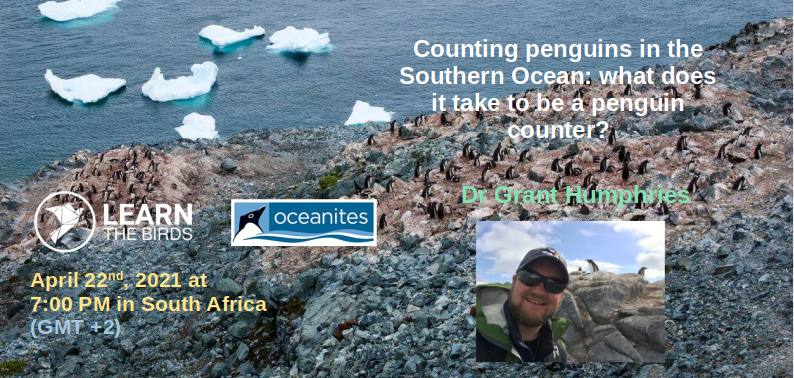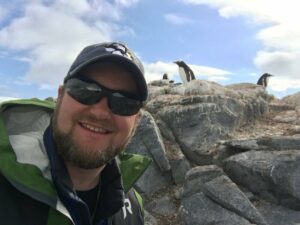
Counting penguins in the Southern Ocean: what does it take to be a penguin counter?
The Southern Ocean is an unforgiving and magical part of the world. Several species of unique seabirds make their home here, with the penguins having some of the most amazing adaptations for life in this harsh environment. Because penguins, like most seabirds, are conspicuous parts of the ecosystem, they are prime candidates to act as sentinels of climate change. The key to making use of penguins to track ecosystem changes is a strong and consistent monitoring program which feeds data directly to scientists and managers. Join Grant on a typical journey to Antarctica leaving from Ushuaia, Argentina, to South Georgia and then to the Antarctic Peninsula. He will discuss the trip from the eyes of a penguin counter and talk about how these data can be used to inform important management decisions in the most pristine environment on the planet.
Additional Details
Webinar link - https://zoom.us/j/99219276276?pwd=L3ZUdUh6aUJ0TnBXQXVVR1pkTEhJdz09
Meeting ID - 992 1927 6276
Passcode - 742061
Event platform - Zoom

 Dr. Grant Humphries is the director of Black Bawks Data Science, lead data scientist at HiDef Aerial Surveying, and a marine ornithologist with a background in machine learning, non-parametric statistics and spatial ecology. Grant has been working with seabirds since 2006 but has experience in a number of fields focusing on ways of implementing cutting edge machine learning techniques to complex ecological datasets. He is the lead editor of a book on machine learning in Ecology that was published by Springer Nature in late 2018 and has published numerous peer-reviewed articles on topics from Arctic sea-ice dynamics to predicting discrete climate events using seabirds as indicators. Since 2015, Grant has been travelling to Antarctica to count penguins as part of a program that has been working in the Southern Ocean for 30 years.
Dr. Grant Humphries is the director of Black Bawks Data Science, lead data scientist at HiDef Aerial Surveying, and a marine ornithologist with a background in machine learning, non-parametric statistics and spatial ecology. Grant has been working with seabirds since 2006 but has experience in a number of fields focusing on ways of implementing cutting edge machine learning techniques to complex ecological datasets. He is the lead editor of a book on machine learning in Ecology that was published by Springer Nature in late 2018 and has published numerous peer-reviewed articles on topics from Arctic sea-ice dynamics to predicting discrete climate events using seabirds as indicators. Since 2015, Grant has been travelling to Antarctica to count penguins as part of a program that has been working in the Southern Ocean for 30 years.